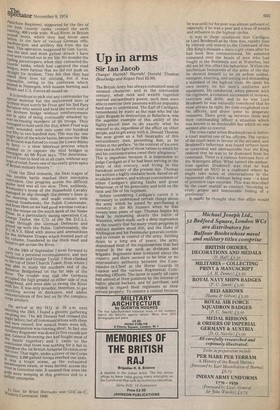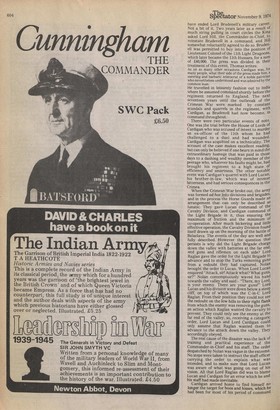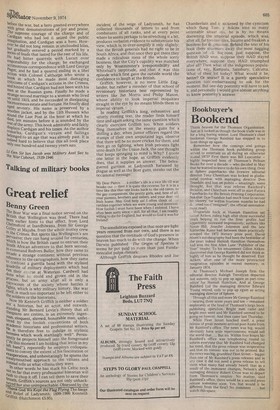Up in arms
Sir Ian Jacob
Charge! Hurrah! Hurrah! Donald Thomas (Routledge and Kegan Paul £5.50) The British Army has always contained men of unusual character, and in the nineteenth century, when rank and wealth together exerted extraordinary power, such men were able to exercise their passions with an impunity hard now to understand. The Earl of Cardigan, remembered by many as the man who led the Light Brigade to destruction at Balaclava, was the supreme example of this ability of the highly-placed man to do exactly what he wanted to do, regardless of the effect on other people, and to get away with it. Donald Thomas has now given us a full biography of this extraordinary man, presenting him, as he writes in the preface, "in the context of his own time and in the light of those values to which he and his contemporaries owed their allegiance." This is important because it is impossible to judge Cardigan as if he had been serving in the army of this century, and living in the humdrum society of the presen,t day. Thomas has written a highly readable book, based on all available evidence, and without concealment of either Cardigan's glaring faults and gross behaviour, or of his generosity and hold on the rank and file of his regiment.
• Before considering Cardigan's career it is necessary to understand certain things about the army which he joined by purchasing a cornetcy in the 8th Hussars when he was twenty-nine years of age. Thomas begins his book by recounting shortly the battle of Waterloo, which made such a deep impression on the country that for many years progress in military matters stood still, and the Duke of Wellington and his Peninsular generals continued to remain in control of the army. Settling down to a long era of peace, the army abandoned most of the organisations that had existedin the war such as divisions and brigades. Regiments were scattered about the country, and there seemed to be little or no intermediate authority between the Commander-in-Chief at the Horse Guards in London and the various Regimental Commanding Officers. The latter in nearly all cases had arrived at their positions by the interest of highly placed backers, and by purchase, and tended to regard their regiments as their private property. To remove a colonel because
he was unfit for his post was ahnost unheard of, especially if he was a peer and a man of wealth and influence in the highest circles.
It was in these conditions that Cardigan or Lord Brudenell as he then was, rapidly rose by interest and money to the Command of the 15th King's Hussars a mere eight years after he had been first commissioned. He assumed command over the heads of men who had fought in the Peninsula and at Waterloo, but did not let this affect his behaviour. Within the intellectual limitations of the army of the day he showed himself to be an ardent soldier, energetic, exacting, and setting and demanding a standard of the highest class. He spent his own money on his men's uniforms and equipment. He conducted, when present with the regiment, a constant succession of reviews, exercises and drills, and as he was Lord Brudenell he was naturally convinced that he must always be right. He rode roughshod over his officers, and drove some to desperate measures. There grew up between them and their commanding officer a situation which was known to be intolerable but which no one seemed able to control.
The crisis came when Brudenell ran in before a court martial one of his officers. The verdict of the court went in favour of the accused, and Brudenell's behaviour was found tor-have been so tyrannical and unreasonable that the King ordered that he was to be dismissed from his command. There is a curious foretaste here of the Watergate affair. What turned the authorities against Brudenell was that he had concealed an NCO in a cupboard where he might take notes of conversations in the regimental office without being seen — a kind of primitive tape-recorder. This was described by the court martial as conduct "revolting to every proper and honourable feeling of a gentleman".
It might be thought that this affair would
have ended Lord Brudenell's military career. Not a bit of it. Two years later as a result of much string pulling in court circles the King asked Lord Hill, the Commander-in-Chief, to reinstate Brudenell in a command, and Hill somewhat reluctantly agreed to do so. Brudenell was permitted to buy into the position of Lieutenant Colonel of the 11th Light Dragoons, which later became the 11th Hussars, for a sum of £40,000. The press was divided in their treatment of this event. Thomas writes: As on so many other occasions Cardigan was, for many people, what their side of the press made him, a sneering and barbaric aristocrat or a noble patrician who nevertheless understood and was admired by the common man.
He travelled in leisurely fashion out to India where he assumed command shortly before the regiment returned to England. The next seventeen years until the outbreak of the Crimean War were marked by constant scandals and quarrels in the regiment, with Cardigan, as Brudenell had now become, in command throughout.
There were two particular events of note. One was the trial before the House of Lords of Cardigan who was accused of intent to murder an ex-officer of the 11th whom he had challenged to a duel and had wounded. Cardigan was acquitted on a technicality. The account of the case makes excellent reading, but can only be believed if one bears in mind the extraordinary homage that was paid in those days to a dashing and wealthy member of the peerage who, whatever his faults might be, had brought his regiment to a high state of efficiency and smartness. The other notable event was Cardigan's quarrel with Lord Lucan, his brother-in-law, which was of intense bitterness, and had serious consequences in the Crimea.
When the Crimean War broke out, the arMY was formed ad hoc into divisions and brigades, and in the process the Horse Guards made an arrangement that can only be described as lunatic. They gave Lucan command of the Cavalry Division, and Cardigan command of the Light Brigade in it, thus ensuring the maximum of friction and the minimum cif co-operation. After much bickering and little effective operation, the Cavalry Division found itself drawn up on the morning of the battle of Balaclava. The events of the day are well and fully described. However the question that persists is why did the Light Brigade charge down the valley with batteries at the far end, and guns and riflemen on each side? Lord. Raglan gave the order for the Light Brigade to advance and to stop the Turks removing guns from a redoubt they had captured. Nolan brought the order to Lucan. When Lord Lucan enquired "Attack, sir! Attack what? What guns, sir?" Nolan contemptuously waved his hand towards the valley and said:'There, my Lord. is your enemy. There are your guns!" Lord Lucan and his division were down below a steep cliff, on top of which was the C-in-C Lord Raglan. From their position they could not see the redoubt on the low hills to their right flank from which the enemy was removing the guns, an action which Raglan wanted the cavalry to prevent. They could only see the enemy at the far end of the valley, so, receiving a categoric order, Lord Lucan and Lord Cardigan could only assume that Raglan wanted them to advance to the attack down the valley. They accordingly obeyed.
The real cause of the disaster was the lack of training and practical experience of the Commander-in-Chief and his staff. The order despatched by Nolan was vague in the extreme. No steps were taken to instruct the staff officer carrying the order to explain what was intended, and to make sure that Lord Lucan was aware of what was going on out of his vision. All that Lord Raglan did was to blame Lucan and Cardigan for an error which he and his staff had made inevitable.
Cardigan arrived home to find himself no longer the target for boos and hisses, which he had been for most of his period of command
before the war, but a hero greeted everywhere With great demonstrations of joy and praise. me supreme courage of the charge and of Cardigan who had led it seized the public iMagination, and Cardigan was a hero. However, he did not long remain in unclouded bliss, but gradually entered a period marked by a series of feuds that lasted for the rest of his life. He had bitter quarrels with Lucan over responsibility for the charge; he exchanged acrimonious correspondence with Lord George Paget; and he had a quarrel ending in a libel action with Colonel Calthorpe who wrote a book in which he made most damaging criticisms of Cardigan's actions in the Crimea, and hinted that Cardigan had not been with his Men at the Russian guns. Finally he made a strange second marriage to a woman who lived Lop until 1915, and he succeeded in dissipating ms enormous estate and fortune. He finally died aged seventy. His name is preserved by a woollen jacket, and by the 11th Hussars who sound the Last Post at the :hour at which he died, ten minutes before it is sounded by the rest of the army. This book admirably and fairly disPlays Cardigan and his times. As the author remarks, Cardigan's virtues and failings !aelooged to an age that was already past. It is Mdeed hard to believe that this all took place only one hundred and twenty years ago.
Lt
—en Sir Ian Jacob was Military Asst Sec to
e War Cabinet, 1939-1946




































 Previous page
Previous page